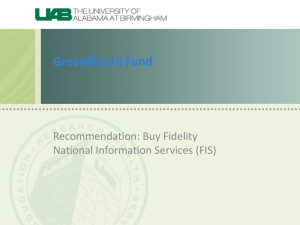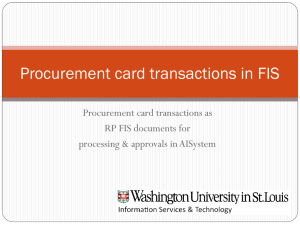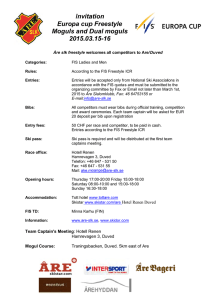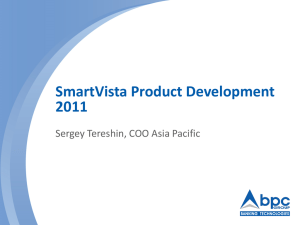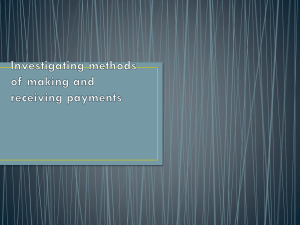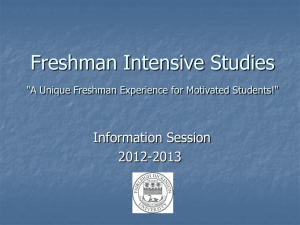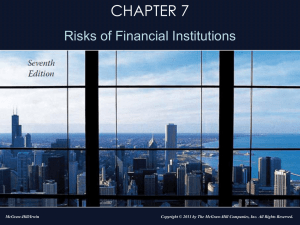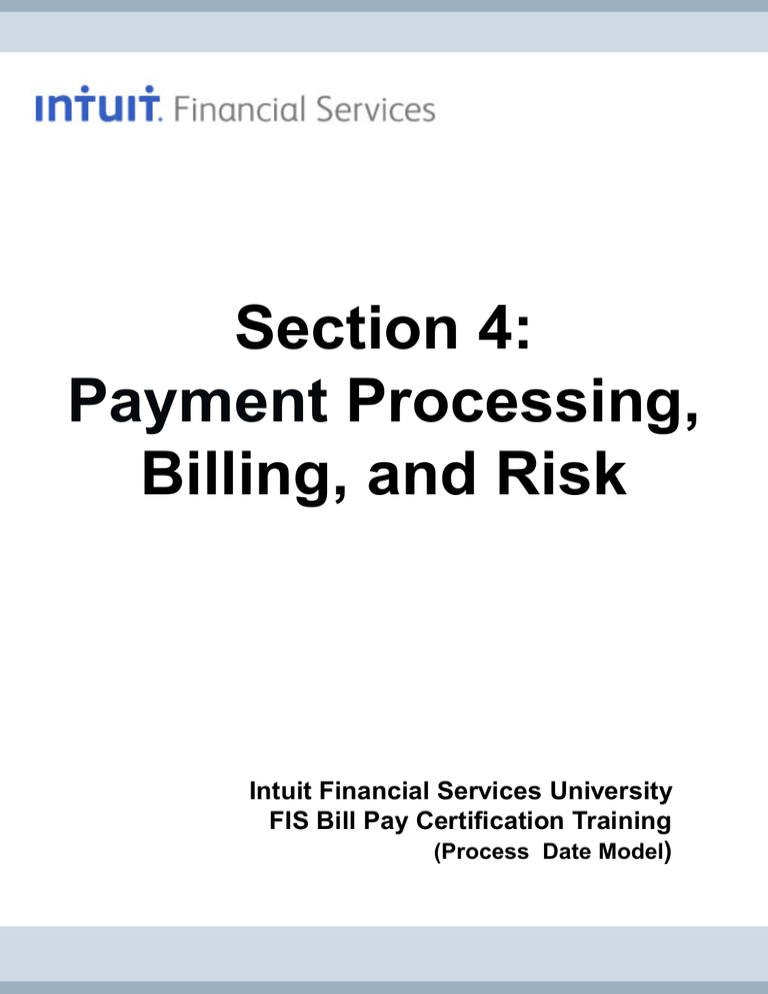
Section 4:
Payment Processing,
Billing, and Risk
Intuit Financial Services University
FIS Bill Pay Certification Training
(Process Date Model)
Bill Pay Certification
Section Objectives
This section prepares you to understand processing details, consumer
billing, and possible risks associated with bill pay including potential
blocks to bill pay accounts.
By the end of this section, you will be able to:
Explain the finer points of bill pay processing, as required from
customer questions and issues
Decide how your consumers are billed for bill pay
Mitigate the two types of bill pay risk
Support consumers if they experience a debit return or a bill pay fraud
situation, including a blocked account
Section 4: Processing
© 2012 Intuit Financial Services
All rights reserved. CONFIDENTIAL AND PROPRIETARY.
Page 2
Bill Pay Certification
Payment Processing
Section 4: Processing
© 2012 Intuit Financial Services
All rights reserved. CONFIDENTIAL AND PROPRIETARY.
Page 3
Bill Pay Certification
Remittance Methods
FIS uses one of the following two methods to remit payments:
1. Electronic - If the payee is found in the database, the payment is sent
out electronically.
• All electronic payments go through the Federal Reserve.
• The payment includes the consumer’s account number with the payee.
• The financial institution sees the standard ACH code/description when
received from the Automated Clearing House.
2. Paper Check - If the payee is added manually, the payment is sent out
via paper check.
• The paper check is drawn against FIS’ corporate checking account.
• The check is printed with consumer’s name, address, account number,
payment date and payment amount. The envelope with the payment
has FIS’ address as the return address.
• Reissued paper checks are not debited a second time.
• The paper check is void after 90 days. If the payment is not posted
and it is approaching the 90-day mark, a service request is
automatically created by FIS.
• A manually added payee can be converted at a later date to an
electronic payee, if there is a match in the FIS database.
Section 4: Processing
© 2012 Intuit Financial Services
All rights reserved. CONFIDENTIAL AND PROPRIETARY.
Page 4
Bill Pay Certification
Send On Date
When setting up a payment, the consumer clicks on a calendar to view the
Send On and Deliver By dates which automatically adjust based on the
payment method.
Send On date - the day that a payment
starts to process. FIS begins
processing payments at 9:30pm
Central Time on this date. Consumers
can schedule, edit or cancel the
payment through Bill Pay anytime
before 9:30 pm Central Time.
Note: Consumers can set the Send On
date out a year in advance.
Deliver By date - the date that FIS
guarantees the payment arrives at the
payee. This should be on or before the
bill’s due date.
For electronic payments:
The calendar automatically adjusts the Send On and Deliver By dates three
banking business days apart.
For check payments:
The calendar automatically adjusts the Send On and Deliver By dates five
banking business days apart.
Note: Payments are only processed on days when the Federal Reserve
is open for business. Weekends and holidays are grayed out on the
calendar.
Section 4: Processing
© 2012 Intuit Financial Services
All rights reserved. CONFIDENTIAL AND PROPRIETARY.
Page 5
Bill Pay Certification
Schedule Payments How do I choose the Process Date?
Mon
Tues
1
2
3
7
8
9
14
15
21
28
Sun
Wed
Thurs
Fri
Sat
4
5
6
10
11
12
13
16
17
18
19
20
22
23
24
25
26
27
29
30
Example #1
Due date for the bill: 22nd
Form of Payment: Electronic
Last day a consumer can set up a bill for guarantee-on time arrival: 17th
Funds debited via ACH: 18th or 19th
Example #2
Due date for the bill: 18th
Form of Payment: Check
Last day a consumer can set up a bill for guarantee on-time arrival: 11th
Funds debited via ACH: 12th or 15th
Section 4: Processing
© 2012 Intuit Financial Services
All rights reserved. CONFIDENTIAL AND PROPRIETARY.
Page 6
Bill Pay Certification
Processing Automatic Payments
Sometimes a payment date for a automatic payment falls on a nonprocessing day. When this occurs FIS processes that payment on the
following banking business day.
Friday
Business
Day
Saturday
Automatic payment
falls on Saturday:
• FIS processes the
payment on
Tuesday, the next
business day.
Payment could be
late because this is
three (3) days after
the consumer
intended it to go
out. FIS would
have processed
the payment on
Monday if it had
been a regular
business day.
Sunday
Monday
Bank
Holiday
Automatic payment
falls on Sunday:
• FIS processes the
payment on
Tuesday, the next
business day.
Payment could be
late because this is
two (2) days after
the consumer
intended it to go
out.
Tuesday
Business
Day
Automatic payment
falls on Monday:
• FIS processes the
payment on
Tuesday, the next
business day.
Payment could be
late because this is
one (1) day after
the consumer
intended it to go
out.
Tip: Advise consumers to check their automatic payments at
the beginning of each month and adjust if needed.
Section 4: Processing
© 2012 Intuit Financial Services
All rights reserved. CONFIDENTIAL AND PROPRIETARY.
Page 7
Bill Pay Certification
On Time & Secure Payment Guarantees
• FIS covers any late-payment related charges (up to $50.00) should a
payment arrive after its due date, as long as the consumer scheduled the
transaction in accordance with FIS’ on time payment guarantee.
• FIS sends the late-payment related charges to the consumer, not the
Payee.
Note: This guarantee pertains to Check and Electronic payments; see next
page for payment guarantee details on Expedited Payments.
Section 4: Processing
© 2012 Intuit Financial Services
All rights reserved. CONFIDENTIAL AND PROPRIETARY.
Page 8
Bill Pay Certification
Payment Guarantees - Expedited Payments
Payment Guarantees
• If the electronic payment is delivered late due to an FIS error, the
consumer can request to have the convenience fee and any incurred
late fees refunded.
• If the overnight check is delivered late due to FIS or delivery vendor
error, the consumer can request to have only the convenience fee
refunded. Any late fees incurred are not refunded.
• Note: The financial institution is responsible for refunding the
convenience fee to the consumer. Intuit Financial Services refunds the
financial institution for the transaction amount specified in their
contract for the specific payment type.
Other Notes:
• Expedited payments are listed separately on the financial institution's
invoice. The invoice also displays the total number of convenience fee
transactions processed as well as the total dollars collected.
• Expedited payment information (number of expedited payments by
type (check/electronic), total $ amount of expedited payments by type,
number of convenience fees by type, total $ amount of convenience
fees by type) are found in the CBS Report in CST.
• The convenience fee is a separate transaction in Internet Banking, in
the Customer Service Tool and on the financial institution's bill.
Section 4: Processing
© 2012 Intuit Financial Services
All rights reserved. CONFIDENTIAL AND PROPRIETARY.
Page 9
Bill Pay Certification
OFAC Compliance
As a provider of "pay anyone" Bill Pay services, FIS recognized the need for
implementation of an OFAC (Office of Foreign Assets Control) suspect list
analysis solution to identify potential payee suspects. They implemented a
procedure for identifying and reporting exact payee name and address
matches with the SDN list.
If a match suspect is identified, FIS calls your financial institution with the
payee name and associated payments. It is the financial institution’s
responsibility to contact that consumer.
Read more on FIS’ OFAC screening solutions on the Client Site at
https://www.diclientsite.com/prodserv/bill_pay_metavante.html
Section 4: Processing
© 2012 Intuit Financial Services
All rights reserved. CONFIDENTIAL AND PROPRIETARY.
Page 10
Bill Pay Certification
Restrictions on Use
Section 4: Processing
© 2012 Intuit Financial Services
All rights reserved. CONFIDENTIAL AND PROPRIETARY.
Page 11
Bill Pay Certification
This page intentionally left blank.
Section 4: Processing
© 2012 Intuit Financial Services
All rights reserved. CONFIDENTIAL AND PROPRIETARY.
Page 12
Bill Pay Certification
Billing
Section 4: Processing
© 2012 Intuit Financial Services
All rights reserved. CONFIDENTIAL AND PROPRIETARY.
Page 13
Bill Pay Certification
Consumer Billing
The financial institution has the choice to handle billing internally or have FIS
bill the consumer. This billing arrangement is set up during the
implementation process.
There are two types of fees: monthly fees, and all other fees like debit
returns. The financial institution decides if FIS debits the consumer for
monthly fees, other fees, or both.
The following applies if FIS is handling the billing:
When does the consumer pay monthly fees?
• Between the 1st and the 5th of the month, the consumer sees an ACH
debit for the monthly fees in their account history, typically labeled “Bill
Payment Service Fee” (this label depends on your processor).
How are the fees routed to the financial institution?
• Intuit Financial Services’ invoice, which is processed on the last business
day of the month, includes all of FIS’ charges; for example, you may see
a New User Setup fee, Per User Fee or Per Item Fee. Note: These may
differ on your invoice - it all depends on your contract with FIS. The
financial institution decides if they want to use any credit from the general
ledger account to reconcile Intuit Financial Services' bill.
When does the financial institution receive the fee revenue?
• On the 20th of the month Intuit Financial Services credits or debits the
financial institutions’ general ledger account with the consumers' fees.
Section 4: Processing
© 2012 Intuit Financial Services
All rights reserved. CONFIDENTIAL AND PROPRIETARY.
Page 14
Bill Pay Certification
Risk: Debit Returns,
Fraud, and Blocks
Section 4: Processing
© 2012 Intuit Financial Services
All rights reserved. CONFIDENTIAL AND PROPRIETARY.
Page 15
Bill Pay Certification
Types of Risk
There are two types of risk with FIS Bill Pay & Presentment.
1. Credit risk:
Credit risk is defined as the potential for a payment to get returned. NSF
is the most common reason, but any return reason code applies.
Ways to manage credit risk:
• Up-sell, or even require, an overdraft account for all bill pay users.
• The FI can decide to pay or return a check or ACH debit from FIS if
funds are not available. If paid, this essentially transfers the risk to your
financial institution.
• Talk to your ACH department. They should know how to identify ACH
debits and checks coming from FIS. Create procedures for when to
return or not return the payment back to FIS. For example, some
financial institutions always pay checks or ACH debits from FIS for
wealth management customers.
2. Fraud risk:
Fraud risk is defined as the potential for a payment to be made
fraudulently, i.e. not approved by the bill pay consumer.
Ways to manage fraud risk:
• Be upfront with FIS and their Fraud team about your business model,
e.g. let them know if you have a lot of customers in foreign countries.
• Know that most often a fraud alert is a false positive.
• Understand how FIS manages fraud risk by reading the “FIS Bill Pay
Risk Factors and Mitigation” document (found on the Client Site).
Section 4: Processing
© 2012 Intuit Financial Services
All rights reserved. CONFIDENTIAL AND PROPRIETARY.
Page 16
Bill Pay Certification
Credit Risk – Debit Processing
FIS uses a risk-based processing model, which means the payment is sent
to the payee without verification of funds or confirmation that the account is
still open.
The consumer’s bank account is debited via
ACH one to two business days after the
specified Send On Date (i.e. the date that
the payment starts to process).
The debit transaction displays on the
Internet Banking Account History screen as
an ACH transaction.
Two bill payments scheduled for the same
day will result in two separate ACH
withdrawals – not one lump sum.
How are transactions identified?
• The ACH file that FIS sends to the financial institution is identified with FIS’
company ID of M391165550.
• The description that the consumer sees for their bill pay transactions within
Internet Banking and on their statements is “Online bill pay” (the financial
institution may change the description – limited to 16 characters).
Section 4: Processing
© 2012 Intuit Financial Services
All rights reserved. CONFIDENTIAL AND PROPRIETARY.
Page 17
Bill Pay Certification
Credit Risk – Debit Returns
If the financial institution returns an ACH debit or a check back to FIS,
FIS places a block on the bill pay account.
How does
the
consumer
know this
happened?
• The consumer receives email alerts when their bill
pay account is blocked, unblocked or when a debit
return occurs.
• Refer to the Training Resources page on the Client
Site for a Quick Help Guide on Sample Alerts.
How does
the block
affect
current
payments?
• Consumers can view their e-bills and cancel pending
payments but cannot schedule new payments.
• Single payments scheduled for delivery during the
blocked timeframe are cancelled.
• Automatic payments that occur while the account is
blocked are cancelled. Future-dated automatic
payments are processed once the block is lifted.
Besides the
block, what
else
happens?
• FIS may attempt to debit the account up to three times
for a payment. The return item fee is assessed for
each debit return.
• FIS attempts one time to place a stop payment on any
debit return (check) over $500. If they cannot stop the
payment, they charge a returned item fee and send
the debit return straight into the collection process.
Section 4: Processing
© 2012 Intuit Financial Services
All rights reserved. CONFIDENTIAL AND PROPRIETARY.
Page 18
Bill Pay Certification
Credit Risk – Blocks
Below are questions you may hear when supporting consumers whose
accounts are blocked because a payment was returned to FIS.
How is the
block
removed?
• FIS uses an automated process to block and
unblock an account.
• If more than one item was returned back to FIS,
everything must clear before the block is lifted.
When is the
block
removed?
• Bill Pay is blocked for three (3) business days after
the consumer resolves the returned item(s);
consumers can access Bill Pay on the fourth (4th)
business day.
• FIS runs an account block/unblock review daily at
2:00 am, 1:00 pm, 6:00 pm Central Time.
What if the
funds are
not
collected?
• FIS closes a Bill Pay account if collection of debit
returns is unsuccessful.
• Accounts blocked for more than one year or for
which a collection item is determined to be
unrecoverable by FIS are automatically terminated.
Section 4: Processing
© 2012 Intuit Financial Services
All rights reserved. CONFIDENTIAL AND PROPRIETARY.
Page 19
Bill Pay Certification
Credit Risk – Expedited Payments
How are debit returns handled for Expedited Payments?
Expedited Payment Debit Return
If FIS’ debit for an expedited payment is returned, the same process that is
in place to handle a debit return for a standard payment is followed.
To recap:
• The Bill Pay account is placed in a Blocked status.
• FIS attempts to debit the account a total of 3 times.
• The Block remains in affect until 3 days after FIS successfully collects
on a re-debit attempt.
• After 3 failed attempts, the account goes to collections.
• The financial institution is charged for each debit return the amount in
their Bill Pay contract.
Convenience Fee NSF
If FIS’ debit attempt on the consumer’s account for the convenience fee is
returned, no further attempts are made to collect it.
However, the uncollected convenience fees are deducted from the monthend settlement owed to the financial institution. In addition, the financial
institution is charged for one debit return. The consumer’s account is not
blocked if the debit return on an Expedited Payment is only for the
convenience fee portion.
Expedited payments, as you learned in Section 3, is an add-on feature, so
this page may or may not apply for you.
Section 4: Processing
© 2012 Intuit Financial Services
All rights reserved. CONFIDENTIAL AND PROPRIETARY.
Page 20
Bill Pay Certification
Fraud Risk – Fraud Monitoring
FIS offers a Fraud Management Service that checks all outgoing payments
to mitigate fraud exposure. The service includes transaction monitoring,
alerting and case management.
The monitoring service is a real‐time analytics
engine that enables FIS to monitor the bill payment
activity.
FIS’s Risk Management department analyzes the
suspicious activity alerts to determine fraudulent
activity through the review of account activity, fraud
patterns and investigator experience.
If an alert occurs, an FIS fraud analyst calls the
consumer to confirm whether or not the payment if
fraudulent. If the consumer is unavailable, FIS then
calls the financial institution.
Fraud monitoring begins immediately upon implementation, and the system
achieves optimum scoring of bill pay activity once 90 days of history has been
accumulated by the scoring models. False-positives are more common during
this 90-day “learning” period.
Section 4: Processing
© 2012 Intuit Financial Services
All rights reserved. CONFIDENTIAL AND PROPRIETARY.
Page 21
Bill Pay Certification
Fraud Risk – Fraud Alerts
When a consumer calls in asking questions about a fraud alert, it’s important
to explain the basics and help with troubleshooting.
What are
some
situations
that can
trigger a
fraud alert?
• Login from a foreign location
• High dollar payment to a personal payee outside the
state
• Fraud trends and patterns in the industry
• Unusual high dollar payments may trigger a call to
verify funds (rather than a fraud alert)
What are the
steps when
a fraud alert
is
triggered?
• FIS calls (never emails) the consumer first to see if
the payment is legitimate or fraudulent.
• The FIS fraud analyst says they are calling on
behalf of the Bill Pay Service at XYZ Financial
Institution. They don’t identify themselves as the
Fraud Department.
• If FIS cannot reach the consumer, they call the
financial institution.
What
happens
when FIS
cannot
reach the
consumer
or the FI?
• If neither the consumer nor the financial institution
cannot be reached to confirm that the payment is
NOT fraudulent, a block is placed on the bill pay
account.
• The consumer gets an email alert that their account
is blocked.
Section 4: Processing
© 2012 Intuit Financial Services
All rights reserved. CONFIDENTIAL AND PROPRIETARY.
Page 22
Bill Pay Certification
Fraud Risk – Blocks
If FIS does block the account because no one can be reached, this
information is important to resolve the situation in a timely manner.
How do I get
in touch with
FIS’ Fraud
department?
• To respond to a fraud alert, the consumer or financial
institution can call (800) 720-1818 and a 5 digit
extension for the fraud analyst who left the message.
• To report fraud or suspected fraudulent activity, or to
clear a fraud block, call (800) 278-6133.
How does a
fraud block
affect
current
payments?
• The impact is the same as a debit return block:
• Consumers can view their e-bills and cancel pending
payments but cannot schedule new payments.
• Single payments scheduled for delivery during the
blocked timeframe are cancelled.
• Automatic payments that occur while the account is
blocked are cancelled. Future-dated automatic
payments are processed once the block is lifted.
How is the
block
removed?
• FIS must receive confirmation that the fraud alert was
a false-positive; FIS releases a fraud block in a matter
of hours (versus 3 days for a debit block).
• Ensure IFS and FIS have your up-to-date fraud
contacts, ideally multiple contacts in case the first
person is unavailable (even your toll-free support
number). This can prevent a block in the first place or
expedite the block removal.
Section 4: Processing
© 2012 Intuit Financial Services
All rights reserved. CONFIDENTIAL AND PROPRIETARY.
Page 23
Bill Pay Certification
Practical Applications – Payment Processing
1.
How does FIS determine how a payment is sent?
2.
How many days does the consumer need to leave for processing?
3.
•
Check payments
•
Electronic payments
Today is Feb 1st and you have a bill that is due on the Feb 13th.
When is the last day you can set up the bill in order for the Payee to
receive payment on time for an electronic payment? For a check?
February
Sun
Mon
Tues
Wed
Thurs
Fri
Sat
1
2
3
10
4
5
6
7
8
9
11
12
13
14
15
16 17
22
23 24
FED.
HOLIDAY
18
19
20
21
25
26
27
28
Section 4: Processing
© 2012 Intuit Financial Services
All rights reserved. CONFIDENTIAL AND PROPRIETARY.
Page 24
Bill Pay Certification
Practical Applications – Payment Processing
(cont’d)
4.
When does the money come out of the consumer’s account and
when is the Payee paid?
5.
When can the consumer cancel a payment and how?
6.
What are the advantages of using FIS’ consumer billing?
7.
Describe the steps FIS takes if the financial institution returns a
Bill Pay item.
8.
How do expedited payment debit returns differ from regular
payment debit returns?
Section 4: Processing
© 2012 Intuit Financial Services
All rights reserved. CONFIDENTIAL AND PROPRIETARY.
Page 25
Bill Pay Certification
Section Objectives - RECAP
In this section, you learned how to:
Explain the finer points of bill pay processing, as required from customer
questions and issues
Decide how your consumers are billed for bill pay
Mitigate the two types of bill pay risk
Support consumers if they experience a debit return or a bill pay fraud
situation, including a blocked account
Section 4: Processing
© 2012 Intuit Financial Services
All rights reserved. CONFIDENTIAL AND PROPRIETARY.
Page 26

